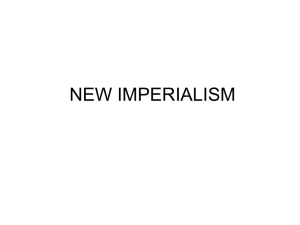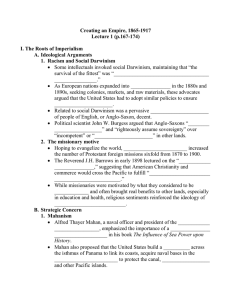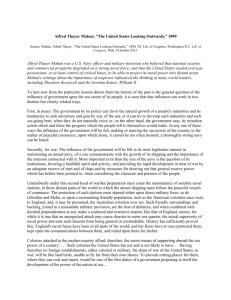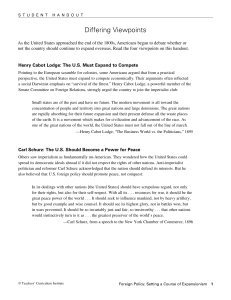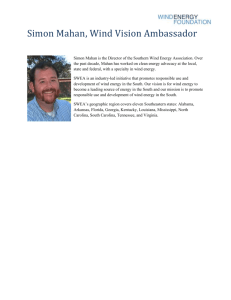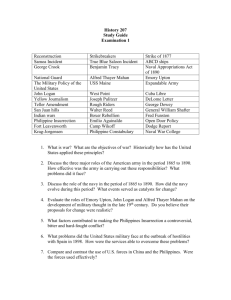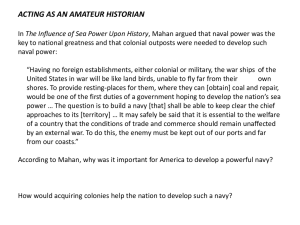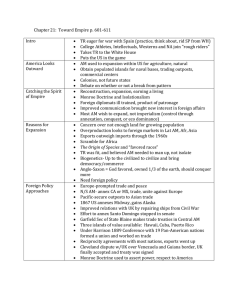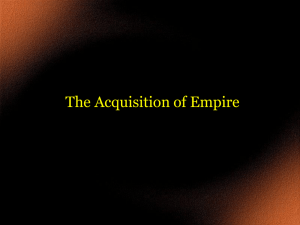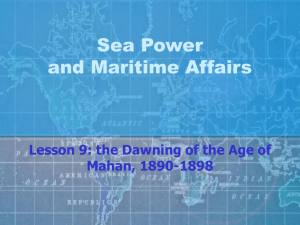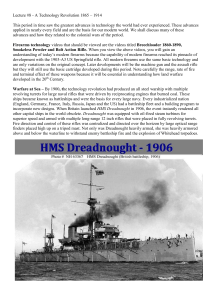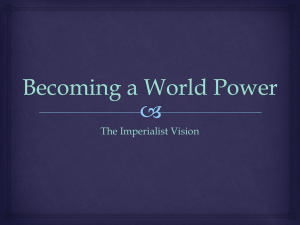“In a recent bulletin of the Superintendent of the Census for 1890
advertisement
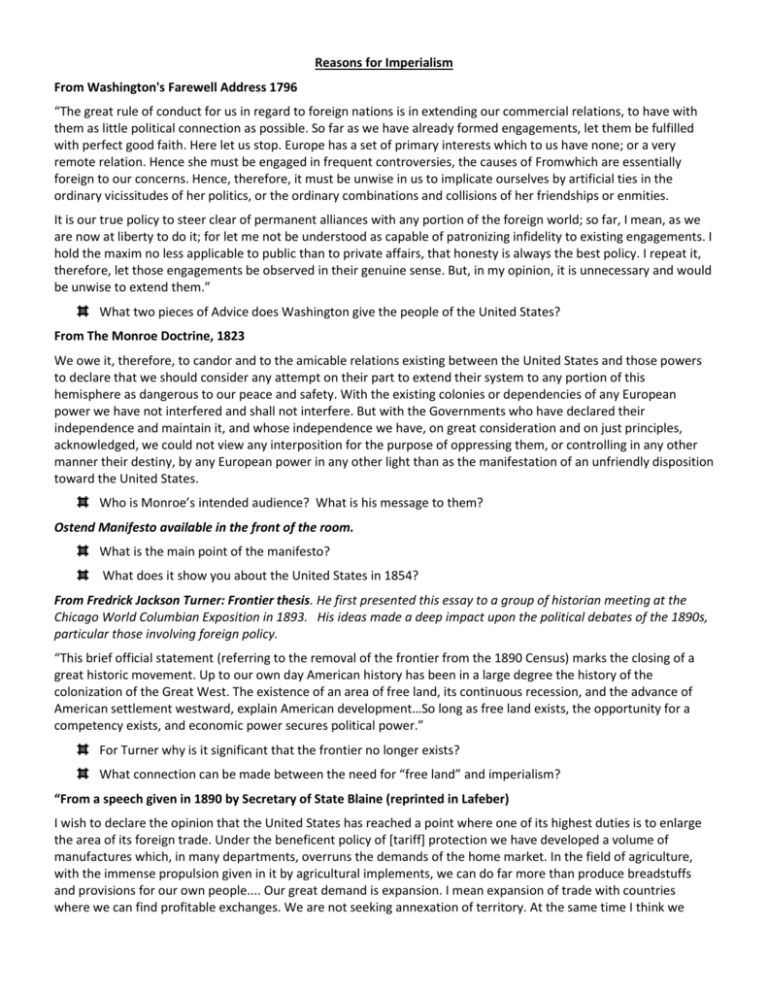
Reasons for Imperialism From Washington's Farewell Address 1796 “The great rule of conduct for us in regard to foreign nations is in extending our commercial relations, to have with them as little political connection as possible. So far as we have already formed engagements, let them be fulfilled with perfect good faith. Here let us stop. Europe has a set of primary interests which to us have none; or a very remote relation. Hence she must be engaged in frequent controversies, the causes of Fromwhich are essentially foreign to our concerns. Hence, therefore, it must be unwise in us to implicate ourselves by artificial ties in the ordinary vicissitudes of her politics, or the ordinary combinations and collisions of her friendships or enmities. It is our true policy to steer clear of permanent alliances with any portion of the foreign world; so far, I mean, as we are now at liberty to do it; for let me not be understood as capable of patronizing infidelity to existing engagements. I hold the maxim no less applicable to public than to private affairs, that honesty is always the best policy. I repeat it, therefore, let those engagements be observed in their genuine sense. But, in my opinion, it is unnecessary and would be unwise to extend them.” What two pieces of Advice does Washington give the people of the United States? From The Monroe Doctrine, 1823 We owe it, therefore, to candor and to the amicable relations existing between the United States and those powers to declare that we should consider any attempt on their part to extend their system to any portion of this hemisphere as dangerous to our peace and safety. With the existing colonies or dependencies of any European power we have not interfered and shall not interfere. But with the Governments who have declared their independence and maintain it, and whose independence we have, on great consideration and on just principles, acknowledged, we could not view any interposition for the purpose of oppressing them, or controlling in any other manner their destiny, by any European power in any other light than as the manifestation of an unfriendly disposition toward the United States. Who is Monroe’s intended audience? What is his message to them? Ostend Manifesto available in the front of the room. What is the main point of the manifesto? What does it show you about the United States in 1854? From Fredrick Jackson Turner: Frontier thesis. He first presented this essay to a group of historian meeting at the Chicago World Columbian Exposition in 1893. His ideas made a deep impact upon the political debates of the 1890s, particular those involving foreign policy. “This brief official statement (referring to the removal of the frontier from the 1890 Census) marks the closing of a great historic movement. Up to our own day American history has been in a large degree the history of the colonization of the Great West. The existence of an area of free land, its continuous recession, and the advance of American settlement westward, explain American development…So long as free land exists, the opportunity for a competency exists, and economic power secures political power.” For Turner why is it significant that the frontier no longer exists? What connection can be made between the need for “free land” and imperialism? “From a speech given in 1890 by Secretary of State Blaine (reprinted in Lafeber) I wish to declare the opinion that the United States has reached a point where one of its highest duties is to enlarge the area of its foreign trade. Under the beneficent policy of [tariff] protection we have developed a volume of manufactures which, in many departments, overruns the demands of the home market. In the field of agriculture, with the immense propulsion given in it by agricultural implements, we can do far more than produce breadstuffs and provisions for our own people.... Our great demand is expansion. I mean expansion of trade with countries where we can find profitable exchanges. We are not seeking annexation of territory. At the same time I think we should be unwisely content if we did not seek to engage in what the younger Pitt so well termed annexation of trade.” What is Blaine saying about the nature of US expansion? What does this say about how the US is different from European Powers? From Albert Bevridge’s “March of the Flag” speech given to congress September 16th 1898. “In Cuba, alone, there are 15,000,000 acres of forest unacquainted with the ax, exhaustless mines of iron, priceless deposits of manganese, millions 0f dollars' worth…There are millions of acres yet unexplored. The resources of Porto Rico have only been trifled with. The riches of` the Philippines have hardly been touched by the fingertips of modern methods. And they produce what we consume, and consume what we produce- They sell hemp, sugar, cocoanuts, fruits of the tropics, timber of price like mahogany; they buy flour, clothing, tools, implements, machinery and all that we can raise and make. Their trade will be ours in time. So Hawaii furnishes us a naval base in the heart of the Pacific; Manila another, at the gates of Asia - Asia, to the trade of whose hundreds of millions American merchants, manufacturers, farmers, have as good right as those of Germany or France or Russia or England; Asia, whose doors must not be shut against American trade. Within five decades the bulk of Oriental commerce will be ours.” What is Bevridge’s main point? Why does Albert Bevridge think we should expand? From Reverend Josiah Strong, Our Country 1885 “Without controversy, these are the forces which, in the past, have contributed most to the elevation of the human race, and they must continue to be, in the future, the most efficient ministers to its progress, It follows then that the Anglo-Saxon, as the great representative of these two ideas, the depository of these two great blessings sustains peculiar relations to the world's future, is divinely commissioned to be, in a peculiar sense, his brother's keeper.” What is Josiah’s central point? Why does Josiah Strong think we should expand? Alfred T. Mahan, The Influence of Sea Power, 1895. The historian and naval strategist Alfred T. Mahan believed that the ability to control the sea was the key factor in shaping history. His 1890 book, The Influence of Sea Power Upon History, was perhaps the single most influential work on foreign policy and military strategy of his time. …The different between the past and the present is that we then, as regards close contact with the power of chief nations of the world, were really in a state of political isolation which no longer exists…Because so much of the world still remains in the possession of savage, or of states whose imperfect development, political or economical, does not enable them to realize for the general use nearly the result of which territory is capable, while at the same time the redundant energies of civilized states, both government and people, are finding lack of openings and scantiness of livelihood at home, that there now obtains a condition of aggressive restlessness with which all have to reckon… …Three things are needful: First, protection of the chief harbors, by fortifications and coast defenses ships… Secondly, naval force, the arm defensive power, which alone enables a country to extend its influence outward. Thirdly, no foreign state should be henceforth acquire a coaling station within three thousand miles of San Francisco… …A navy, therefore, whose primary sphere of action is was, is, in any particular case, will bring us into new political relations and may entail serious disputes with other states… Why does Mahan believe a navy is important? What do we need to acquire to have a strong navy? Which author(s) above had an influence on Mahan?
